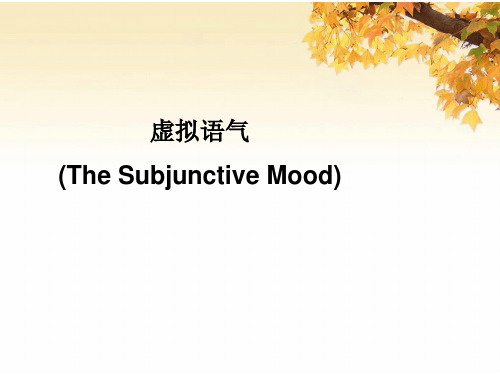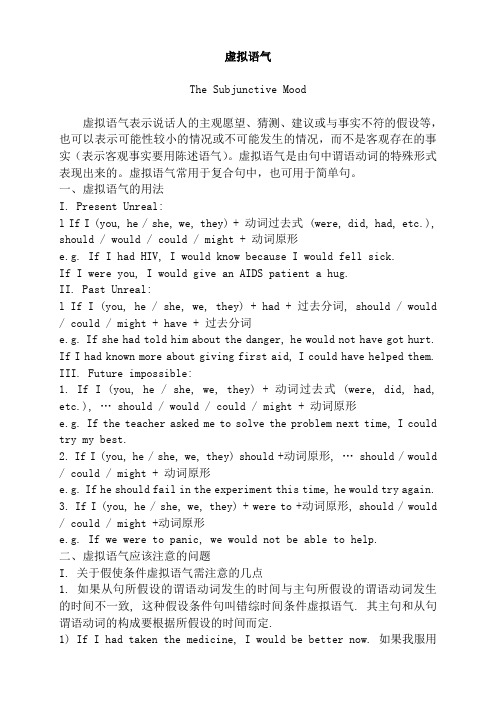the Subjunctive Mood (虚拟语气总结)
- 格式:ppt
- 大小:310.50 KB
- 文档页数:15




虚拟语气The Subjunctive Mood虚拟语气表示说话人的主观愿望、猜测、建议或与事实不符的假设等,也可以表示可能性较小的情况或不可能发生的情况,而不是客观存在的事实(表示客观事实要用陈述语气)。
虚拟语气是由句中谓语动词的特殊形式表现出来的。
虚拟语气常用于复合句中,也可用于简单句。
一、虚拟语气的用法I. Present Unreal:l If I (you, he / she, we, they) + 动词过去式 (were, did, had, etc.), should / would / could / might + 动词原形e.g. If I had HIV, I would know because I would fell sick.If I were you, I would give an AIDS patient a hug.II. Past Unreal:l If I (you, he / she, we, they) + had + 过去分词, should / would / could / might + have + 过去分词e.g. If she had told him about the danger, he would not have got hurt. If I had known more about giving first aid, I could have helped them. III. Future impossible:1. If I (you, he / she, we, they) + 动词过去式 (were, did, had, etc.), … should / would / could / might + 动词原形e.g. If the teacher asked me to solve the problem next time, I could try my best.2. If I (you, he / she, we, they) should +动词原形, … should / would / could / might + 动词原形e.g. If he should fail in the experiment this time, he would try again.3. If I (you, he / she, we, they) + were to +动词原形, should / would / could / might +动词原形e.g. If we were to panic, we would not be able to help.二、虚拟语气应该注意的问题I. 关于假使条件虚拟语气需注意的几点1. 如果从句所假设的谓语动词发生的时间与主句所假设的谓语动词发生的时间不一致, 这种假设条件句叫错综时间条件虚拟语气. 其主句和从句谓语动词的构成要根据所假设的时间而定.1) If I had taken the medicine, I would be better now. 如果我服用了那种药的话, 现在就会好些了.2) If the weather had been finer, the crops would be growing still better. 如果(前些日子)天气更好些, 庄稼一定会长得更好.2. If it were not for / had not been for…也是一种条件虚拟语气从句, 译为“要不是因为……”.1) If it hadn’t been for the doctor, he wouldn’t have recovered so soon.2) If it were not for the lack of space, we would hold the sports meet today.3. 有些条件是由一些短语引出的 (but for, with, without; otherwise, or, but, etc,)1) We couldn’t have achieved so much without your help (= If we had not had your help).2) Without solar radiation, animals and plants would die.3) With better equipment, we could have done it better.4) But for electricity (= If there were no electricity), there would be no modern industry.5) I should have returned the book last week, but I was so busy thatI forgot to do so.6) He was having a meeting; otherwise he would have come over to help us.7) He felt very tired yesterday, or he would have attended the party.4. 在某些隐含的虚拟条件简单句中, 虚拟语气可通过上下文表现出来. 谓语动词用虚拟形式.1) Any men in his position would have done like that.2) You should (ought to) have come earlier.II. 虚拟语气祈使语气的混合使用在有些情况下, 条件从句中的谓语由”should + 原形动词”构成, 这时主句的谓语动词既可以是虚拟语气或陈述语气, 也可以是祈使语气.1. If it should rain, the plan will / would be called off.2. Should anyone phone, please tell them I’m busy.3. Even if (If) it should get stormy, I will go.III. 表示要求, 建议, 命令的虚拟语气表示要求, 建议, 命令的从句中, 谓语动词要用should + 原形动词, 其中可以should 省略. 下列例句可以表示这种虚拟语气.a. 主宾语从句表示法: suggest, order, request, advise, require,insist, ask, demand, command, propose等动词后面的宾语从句要用原形动词should + 原形动词, 可以省略.1. The doctor advised that I (should) take a rest.2. The London dockers demanded that their wages (should) be raised.3. He insisted that the meeting (should) not be put off.l 当suggest, insist 等动词表示”暗示, 坚持说”时, 其宾语从句中的谓语动词不需要用虚拟语气, 要用陈述语气.1. Are you suggesting that I am not suited for the job?2. He insisted that he was innocent.b. 主语从句表示法: 当以上动词用在下列句型中时, 主语从句也应该用should + 原形动词1. It is suggested that the building (should) be pulled down.2. It is ordered that the work (should) be started at once.l 在It is (was) strange (necessary, wonderful, important, etc.) that…句型中, strange, necessary等后面的主语从句中用should + 原形动词, should可以省略.3. It is strange that he (should) refuse to come to the party.4. It is necessary that a doctor (should) be sent for at once.5. It is important that we should learn from toehrs.e. 表语从句表示法.suggestion, proposal, order, advice, demand 等名词作主语时, 其后面的表语从句中也用虚拟语气, 即should + 原形动词, should 也可以省略.1) My advice is that you (should) give up smoking.c. wish 后面所跟宾语从句要求谓语动词用虚拟语气.e.g. I wish that she were here with me and that we weren’t sick.I wish I had sent the old man to hospital in time.d. 在as if引起的从句中,动词一般用虚拟语气, 通常用weree.g. People treat me as if I were a dangerous person.I remember the whole thing as if it happened yesterday.f. 同位语从句表示法.1. That evening came the order that we (should) cross the river at once.IV. 虚拟语气中常见的句型有1. It is (high / about) time that…这一从句的谓语动词用过去式或should + 原形动词, 其中should不可以省略. 此句型译为”该是……时候了”.2. would rather sb. did sth. / had done sth.此句型表示”宁愿让某人……”, 如果是没有发生的动作, 从句用过去时; 如果是已经发生的事, 从句用过去完成时.1) I’d rather you left tomorrow.2) I’d rather they hadn’t gone to school yesterday.3. if only…此句型表示”要是……就好了”. 其后面句子的时态与wish引导的宾语从句相同, 既:如果虚拟现在, 要用一般过去时; 如果是虚拟过去, 要用过去完成时; 如果是虚拟将来, 则应该用 would或 could加原形动词.1) If only I were a bird!2) If only I had worked hard as a student!3) If only I could land on the moon!4. 连接词in case可用来引起的虚拟语气. 形式通常为: in case + 主语 + should +动词原形. in case句中should 的可以省去, 也可以不用虚拟语气, 而用陈述语气.1) He took his rain coat with him in case it should rain.2) He doesn’t dare to leave the house in case he is (should be) recognized.。


虚拟语气(The Subjunctive Mood)1.语气1.1语气(Mood)·谓语动词有“三大本领”,表示动作的时间(时Tense)、动作的状态(体Aspect)、动作的假设,情感等(式Mood)。
这里的“式(Mood)”又译作“语气”,是一种语法概念,并非我们说话中“温柔的,凶狠的,愤怒的语气”,千万别弄混。
英语动词语气最主要的是这三种语气:陈述语气(The Indictive Mood)祈使语气(The Imperative Mood)虚拟语气(The Subjunctive Mood)注:英语动词语气的数量有不同的说法,也有的语法体系会包含“疑问语气”,“条件语气”,“感叹语气”等。
本章会先略述陈述语气和祈使语气,再着重讲解虚拟语气。
1.2陈述语气(The Indictive Mood)陈述语气(现译作“陈述式”)就是描述现实:The rabbit ate the carrot. 这兔子吃了这胡萝卜。
He goes to church every Sunday. 他每周日去做礼拜。
也可以进行提问:Did the rabbit eat the carrot? 这兔子吃了这胡萝卜吗?Does he go to church every Sunday? 他每周日去做礼拜吗?(注:有的语法体系会把这里的动词语气另外归类为“疑问语气(The Interrogative Mood)”,虽然“疑问语气在英语中的构成往往只是改变词序或加助动词。
)可以说95%的英语句子都是陈述语气。
1.3祈使语气(The Imperative Mood)1)祈使语气,现译作“祈使式”,是话者向对方提出要求、下达命令、发出指令/劝告等所用的动词形式。
祈使句中的谓语动词,都用动词原形。
Please be seated. 请做下。
(请求)Put down your gun! 把枪放下!(命令)Don’t overwork yourself. 不要过于劳累。
虚拟语气语气(mood)也是动词的一种形式变化。
这和中文中的语气是不一样的。
它表示说话者对所指的动词或状态所持的态度,而且,在谓语动词上有所体现,而中文没有体现。
语气可分为三种:陈述语气、祈使语气和虚拟语气。
虚拟语气(the Subjunctive Mood)表示说的话不是事实,或者是不可能发生的情况,而是一种愿望、建议或与事实相反的假设等。
一、虚拟条件句1.主句和从句都与现在事实相反时,从句用一般过去时,be的形式要用were,主句用would/could/ should/might+不定式一般式。
If I were you, I should not go with him.2.主句和从句都与过去事实相反时,从句用过去完成时,主句用would/should/could/might+不定式完成式。
If I had tried hard last term, I would have succeeded.3.当主句和从句都与将来事实相反,或指不大可能发生的事的时候,从句和与现在事实相反的从句时态相同,或用should/were to+不定式一般式,主句和与现在事实相反的主句相同。
If it rained/were to rain/should rain tomorrow, the match would be put off.4.在使用虚拟条件句时,由于语言环境的千差万别,各种时间关系混合使用是很常见的。
如果逻辑上讲得通,主句和从句的动词时态可进行各种各样的搭配。
If it hadn't rained those days, (从句与过去事实相反)1 work would be finished next week. (主句与将来事实相反)2.here wouldn't be any water in the river now. (主句与现在事实相反)一、语气及其种类1.语气(mood)语气是一种动词形式,表示讲话人对某一行为或事情的看法和态度。
Subjunctive Mood 虚拟语气英文句子中谓语动词的语气有三种: (2)虚拟语气的应用 (2)虚拟语气的分类 (3)简单句中的虚拟语气 (3)状语从句中的虚拟语气 (3)if条件句类型 (3)if引导的非真实条件句 (4)省略if (倒装)的虚拟条件句 (5)含蓄虚拟条件句 (5)错综时间虚拟句 (6)If it were (had been) for ...中的虚拟语气. (6)as if / as though 引导的方式状语从句 (6)名词性从句中的虚拟语气 (7)主语从句中的虚拟语气 (7)宾语从句中的虚拟语气 (7)wish引导的宾语从句中的虚拟语气 (8)表语从句与同位语从句中的虚拟语气 (8)定语从句中的虚拟语气 (8)其它句型中的虚拟语气 (9)would rather/ would sooner 等短语引导的宾语从句 (9)if only引导的从句 (9)in case, lest, for fear that引导的从句 (9)be, intend, mean, plan, want, hope 等引起的虚拟语气 (10)whether引导的让步状语从句中的虚拟语气 (10)英文句子中谓语动词的语气有三种:A) 直陈语气(The Indicative Mood)-说话人认为他所表述的是事实He began to learn English when he was eight.B) 祈使语气(The Imperative Mood)-用于祈使句Close the door, please.C) 虚拟语气(The Subjunctive Mood)-说话人的话只是一种主观愿望和假设、可能、建议。
If I had seen her yesterday, I should have spoken to her. (事实上我没看见她)I wish I knew French. (只是一种愿望)He suggested that we (should) come another day. (建议)虚拟语气的应用A. 提出含蓄的建议If I were you I would take the job.B. 提出委婉的批评If you had been more careful, you would have avoided the mistake.He spoke to me as if I were a child.C. 表示间接的责备或埋怨You could have informed us of your arrival.D. 表示懊悔或懊恼If I had followed your advice, I would not have failed.We could have become champions.E. 表示遗憾They might have won the match.I wish I had the ability to help you out of difficulty.F. 表示让步(Even) if that be the official view, it cannot be accepted.G. 表达一种难以实现的愿望If only I knew the answer!H. 套语型虚拟式经常表达祝愿、诅咒等含义Long live the People’s Republic Of China!God Bless you! God Damn it! = goddamnitI. 表示假设或想象的描述,不带感情色彩Just suppose everyone were to give up smoking and drinking.J. 出于一种描述目的He talked as if he knew the secret.He behaved as though he were a child.虚拟语气的分类虚拟语气简单句(may)复合句其他句式状语从句(if/as if/as though)名词性从句定语从句(It’s (high) time that)宾语从句(wish/suggest)主语从句(It’s + adj./n.+that...)表语从句(demand/suggestion)同位语从句(order/suggestion)for feat thatif onlyin casewould rather简单句中的虚拟语气暗含虚拟条件,虚拟语气可通过上下文表现出来。
英语《虚拟语气》语法知识总结归纳虚拟语气(Subjunctive mood)是英语中一种特殊的语气形式,用于表示说话人的假设、愿望、建议、要求、命令等非真实情况。
虚拟语气在句子中通常与动词的调整和语法结构上的变化相关。
以下是对虚拟语气的语法知识的总结归纳:1.条件句中的虚拟语气:1.1 条件句中表示对现在的假设:使用虚拟语气的一般公式是:if + 主语 + 过去式,主句使用would/could/should/might + 动词原形。
例如:- If I were you, I would go to the meeting.(如果我是你,我会去开会。
)注意,这里的"were"是一个特殊的虚拟语气形式,用于所有人称和数。
- If she had studied harder, she might have passed the exam.(如果她努力学习,她可能会通过考试。
)1.2 条件句中表示对过去的假设:使用虚拟语气的一般公式是:if + 主语 + 过去完成时,主句使用would/could/should/might + have + 过去分词。
例如:- If I had known it, I would have told you.(如果我知道了,我会告诉你的。
)- If she had arrived earlier, she might have caught the bus.(如果她早点到,她可能会赶上公共汽车。
)2.虚拟条件句中的特殊情况:2.1 在虚拟条件句中表示命令、建议时,主句中的动词可以使用动词原形(而不是would/could/should/might + 动词原形)。
例如:- If you have any questions, please let me know.(如果你有任何问题,请告诉我。
)- If I were you, I would take a break.(如果我是你,我会休息一下。